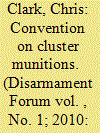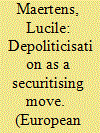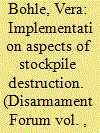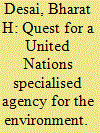| Srl | Item |
| 1 |
ID:
097159


|
|
|
| 2 |
ID:
161271


|
|
|
|
|
| Summary/Abstract |
Created in 1972, the United Nations Environment Programme (UNEP) has a normative mandate to promote the protection of the environment at the international level. However, since 1999, the organisation has been conducting field assessments in postconflict situations and addressing the role of natural resources in conflict, framing the environment as a security issue. To do so, the programme insists on its neutrality as a technical and ‘apolitical’ actor within the UN system. Considering depoliticisation as a political act, this article unpacks the concrete practices by which international organisations (IOs) enact depoliticisation. It further argues that IOs can perform securitising moves through practices and techniques presented as outside of the political realm. It draws upon the recent work on depoliticisation at the international level and reinforces studies considering the links between (de)politicisation and securitisation.
|
|
|
|
|
|
|
|
|
|
|
|
|
|
|
|
| 3 |
ID:
097155


|
|
|
| 4 |
ID:
112477


|
|
|
|
|
| Publication |
2012.
|
| Summary/Abstract |
Recent years have seen intense intergovernmental deliberations on issues concerning governance in the field of environment. Their aim has been to address the role of the institutions that provide platforms for international environmental cooperation. There are two main lines of enquiry: the role of regime-specific institutions that cater to sectoral regulatory frameworks (popularly known as multilateral environmental agreements, or MEAs); and the role of institutions that are established to follow up on global environmental conferences or a specific environmental task. Most of these institutions reflect intergovernmental consensual process. However, there are concerns about their proliferation and there is a growing cacophony of calls to 'bring coherence to the fragmented landscape of MEAs, intergovernmental bodies, UN system entities and other international organizations' (Sha Zukang (2011) 'Legal and policy dimensions of sustainable development: expected contribution of Rio + 20', Environmental Policy and Law, 41(6), pp. 244-246, at p. 245). In fact the need to bring order to environmental governance has assumed great importance and urgency if environmental cooperation is to be achieved. This paper explores, in particular, the role of the United Nations Environment Programme and its potential for conversion to a specialised agency of the UN.
|
|
|
|
|
|
|
|
|
|
|
|
|
|
|
|